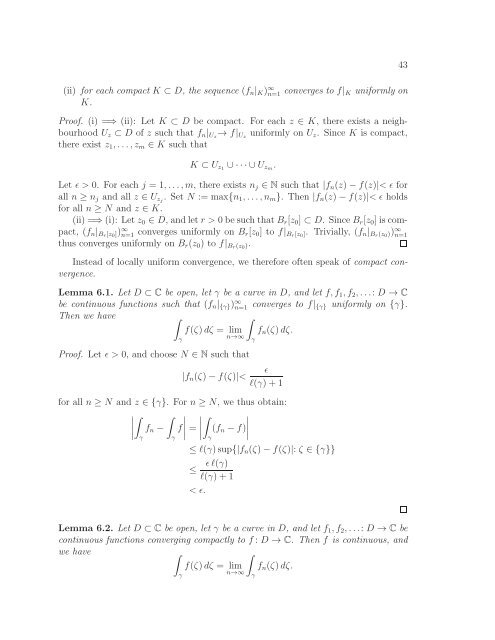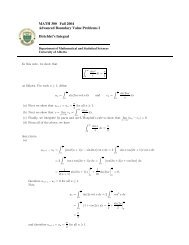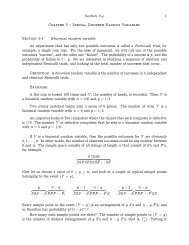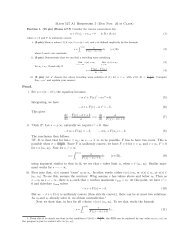Math 411: Honours Complex Variables - University of Alberta
Math 411: Honours Complex Variables - University of Alberta
Math 411: Honours Complex Variables - University of Alberta
Create successful ePaper yourself
Turn your PDF publications into a flip-book with our unique Google optimized e-Paper software.
(ii) for each compact K ⊂ D, the sequence (fn|K) ∞ n=1 converges to f|K uniformly on<br />
K.<br />
Pro<strong>of</strong>. (i) =⇒ (ii): Let K ⊂ D be compact. For each z ∈ K, there exists a neighbourhood<br />
Uz ⊂ D <strong>of</strong> z such that fn|Uz→ f|Uz uniformly on Uz. Since K is compact,<br />
there exist z1,...,zm ∈ K such that<br />
K ⊂ Uz1 ∪···∪Uzm.<br />
Let ǫ > 0. For each j = 1,...,m, there exists nj ∈ N such that |fn(z)−f(z)|< ǫ for<br />
all n ≥ nj and all z ∈ Uzj . Set N := max{n1,...,nm}. Then |fn(z)−f(z)|< ǫ holds<br />
for all n ≥ N and z ∈ K.<br />
(ii)=⇒(i): Letz0 ∈ D, andletr > 0besuchthatBr[z0] ⊂ D. SinceBr[z0]iscompact,<br />
(fn|Br[z0]) ∞ n=1 converges uniformly on Br[z0] to f|Br[z0]. Trivially, (fn|Br(z0)) ∞ n=1<br />
thus converges uniformly on Br(z0) to f|Br(z0).<br />
Instead <strong>of</strong> locally uniform convergence, we therefore <strong>of</strong>ten speak <strong>of</strong> compact convergence.<br />
Lemma 6.1. Let D ⊂ C be open, let γ be a curve in D, and let f,f1,f2,...: D → C<br />
be continuous functions such that (fn|{γ}) ∞ n=1 converges to f|{γ} uniformly on {γ}.<br />
Then we have �<br />
γ<br />
�<br />
f(ζ)dζ = lim<br />
n→∞<br />
Pro<strong>of</strong>. Let ǫ > 0, and choose N ∈ N such that<br />
|fn(ζ)−f(ζ)|<<br />
γ<br />
fn(ζ)dζ.<br />
ǫ<br />
ℓ(γ)+1<br />
for all n ≥ N and z ∈ {γ}. For n ≥ N, we thus obtain:<br />
��<br />
� �<br />
� �<br />
� fn � − f�<br />
� =<br />
��<br />
�<br />
� �<br />
� (fn � −f) �<br />
�<br />
γ<br />
γ<br />
γ<br />
≤ ℓ(γ)sup{|fn(ζ)−f(ζ)|: ζ ∈ {γ}}<br />
≤ ǫℓ(γ)<br />
ℓ(γ)+1<br />
< ǫ.<br />
Lemma 6.2. Let D ⊂ C be open, let γ be a curve in D, and let f1,f2,...: D → C be<br />
continuous functions converging compactly to f: D → C. Then f is continuous, and<br />
we have � �<br />
f(ζ)dζ = lim<br />
n→∞<br />
fn(ζ)dζ.<br />
γ<br />
γ<br />
43







